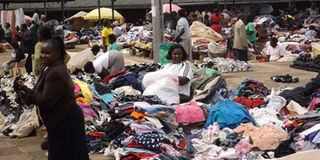Ban on ‘mitumba’ will deal death blow to survival of poor women

Second hand clothes sellers display their wares at an open air Market in Olkalou Nyandarua County on March 10, 2016. PHOTO | JOHN GITHINJI | NATION MEDIA GROUP
What you need to know:
- A big casualty of anti-informal sector policies, such as the ban on used clothing, would be women, who largely outnumber men in the industry.
- In sub-Saharan Africa, 74 per cent of women’s employment is informal, in contrast with 61 per cent of men.
- In Kenya and Rwanda, which seek to ban imports of used clothing, over 80 per cent of women are employed in the informal sector.
In March this year, the East African Community proposed a ban on imported used clothing by 2019 in an attempt to revitalise the local apparel industry and bolster economies.
The argument that protectionism will lead to East African industrialisation has been used since at least 2004, conveniently ignoring the fact that textile factories are in trouble in the region because of corruption, insecure property rights, and bad governance.
The anti-second hand clothing protectionist argument has also been bolstered by the loaded language used to describe the industry in Africa. Anti-trade activists speak of the “sale of Western cast-offs” and claim that all used clothing that gets to Africa is “low-grade stuff no one else wants”.
This language associates the industry with shame, arguing that it perpetuates the legacy of colonialism. Yet, this language fails to acknowledge how the industry bolsters entrepreneurship. Georgetown University Professor Pietra Rivoli describes how mitumba (used clothing) foster entrepreneurship in Tanzania:
“A drive through the large mitumba markets in Dar es Salaam shows a level of economic activity unmatched anywhere else in the city and hundreds, perhaps thousands, of people who are very clearly working.
“The traders, importers, sorters, and launderers who people the mitumba trade show an astonishing variety of skills, and the tailors, in particular, are a marvel of the employment created by mitumba. Not only do the tailors adapt Americans’ clothing to African figures, they create blouses and shirts to match ‘new’ suits, and they turn curtains into dresses, socks into bath mats, and skirts into tablecloths and tablecloths into skirts.”
The proposal for used is an attempt to curb the informal industry in East Africa to increase government revenue through taxation and regulation. The informal sector is still viewed as inferior to the formal industry, regardless of its role in job creation on the continent. Even the African Development Bank recognises that the informal sector helps spontaneously drive African economies in contexts where there are limited jobs for low-skilled workers.
A big casualty of anti-informal sector policies, such as the ban on used clothing, would be women, who largely outnumber men in the industry. In sub-Saharan Africa, 74 per cent of women’s employment is informal, in contrast with 61 per cent of men. In Kenya and Rwanda, which seek to ban imports of used clothing, over 80 per cent of women are employed in the informal sector.
Government failure to create jobs, limited employment opportunities, lack of skills, and high illiteracy rates for African women have led to this gender gap. BBC Africa posted a video on Facebook in October featuring Sandra Birabwa, a Ugandan street vendor who sells used clothing. She describes the precariousness of her work situation, heightened by a constant fear of being arrested simply for trying to make ends meet.
In her country, commerce is limited to formal stores or costly government designated markets. The feature shows how government policies regarding the informal industry in Uganda disproportionately affect women and the proposed used clothing ban could lead to further impoverishment and a decline in gender equality in the region.
Further, depriving women in this industry of their livelihood would also have adverse effects on their children’s social and economic potential. Evidence from countries as varied as Brazil, China, India, South Africa, and the United Kingdom shows that female control of household income has more benefits for children.
While selling used clothing may not be the most ideal job for some, it does provide a level of economic autonomy to women and instituting a ban without any infrastructure to replace the lost jobs, or without first improving local textile performance, would be premature.
This does not dismiss the importance of improving the East African textile industry. However, an import ban would not help the East African clothing manufacturing industry. What is needed is a policy that promotes manufacturing through support for the private sector and improving the landscape for business.
Ms Ndlovu is the managing editor of Young Voices. Stacy is from Zimbabwe. [email protected]





